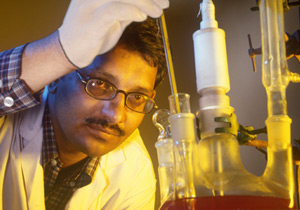KANEKA
CPVC joint venture with Mitsui and Meghmani Organics in India / USD 120m investment / Start-up planned for 2014 / Output to go towards meeting subcontinent's rising CPVC needs
Japanese chemical group Kaneka (Osaka; www.kaneka.co.jp) on 6 December 2011 announced that it had entered into a joint venture agreement with fellow Japanese chemicals corporation Mitsui (Tokyo; www.mitsui.com) and India’s pigments and specialty chemicals producer Meghmani Organics (Ahmedabad, Gujarat; www.meghmani.com) for a 20,000 t/y chlorinated PVC (CPVC) plant in Dahej, Gujarat / India. All in all, the three partners are to invest USD 120m in the facility, the capacity of which is to be ramped up successively following the scheduled start-up in 2014.
 India’s Meghmani will support the new CPVC joint venture with its local management experience (Photo: Meghmani) |
At 41% ownership, Kaneka will control most of the shares in the jv, followed by Meghmani with 39% and Mitsui with 20%. Whereas Kaneka will provide the necessary technology for the plant, Meghmani brings to the table not only the land the jv will stand on but also local management experience. As for Mitsui, it has been tasked with procuring raw material PVC and sell and market the resultant CPVC output in India.
The initial agreement for the jv, called Trience Speciality Chemicals (Ahmedabad, Gujarat / India) was signed in early October 2011, and the three parent companies expect their joint venture to be formally established before the end of this year. The Gujarat-based company will have start-up capital of a little less than EUR 1.5m, and will specialise in the production and sale of CPVC resin in India, in an effort to speed up the development of this particular market on the subcontinent.
Chlorinated polyvinyl chloride shares many of the properties of PVC, including workability, corrosion-resistance, bendability and fire-retardant properties. What sets it apart is its ability to withstand corrosive water at higher temperatures than PVC and is also more ductile, allowing greater crush resistance. CPVC’s mechanical strength makes it particularly suitable as a replacement for metal pipes, which helps explain the reason for locating the jv in India, where galvanised iron pipe is increasingly being replaced by CPVC alternatives.
Kaneka operates CPVC plants in its home country Japan as well as the US; with total global capacity of 46,000 t/y. The Japanese player has been trying to get in on the Indian CPVC market since last year, when it established Kaneka India in an effort to set up a chlorinated PVC plant on the subcontinent.
The initial agreement for the jv, called Trience Speciality Chemicals (Ahmedabad, Gujarat / India) was signed in early October 2011, and the three parent companies expect their joint venture to be formally established before the end of this year. The Gujarat-based company will have start-up capital of a little less than EUR 1.5m, and will specialise in the production and sale of CPVC resin in India, in an effort to speed up the development of this particular market on the subcontinent.
Chlorinated polyvinyl chloride shares many of the properties of PVC, including workability, corrosion-resistance, bendability and fire-retardant properties. What sets it apart is its ability to withstand corrosive water at higher temperatures than PVC and is also more ductile, allowing greater crush resistance. CPVC’s mechanical strength makes it particularly suitable as a replacement for metal pipes, which helps explain the reason for locating the jv in India, where galvanised iron pipe is increasingly being replaced by CPVC alternatives.
Kaneka operates CPVC plants in its home country Japan as well as the US; with total global capacity of 46,000 t/y. The Japanese player has been trying to get in on the Indian CPVC market since last year, when it established Kaneka India in an effort to set up a chlorinated PVC plant on the subcontinent.
12.12.2011 Plasteurope.com [221063-0]
Published on 12.12.2011
